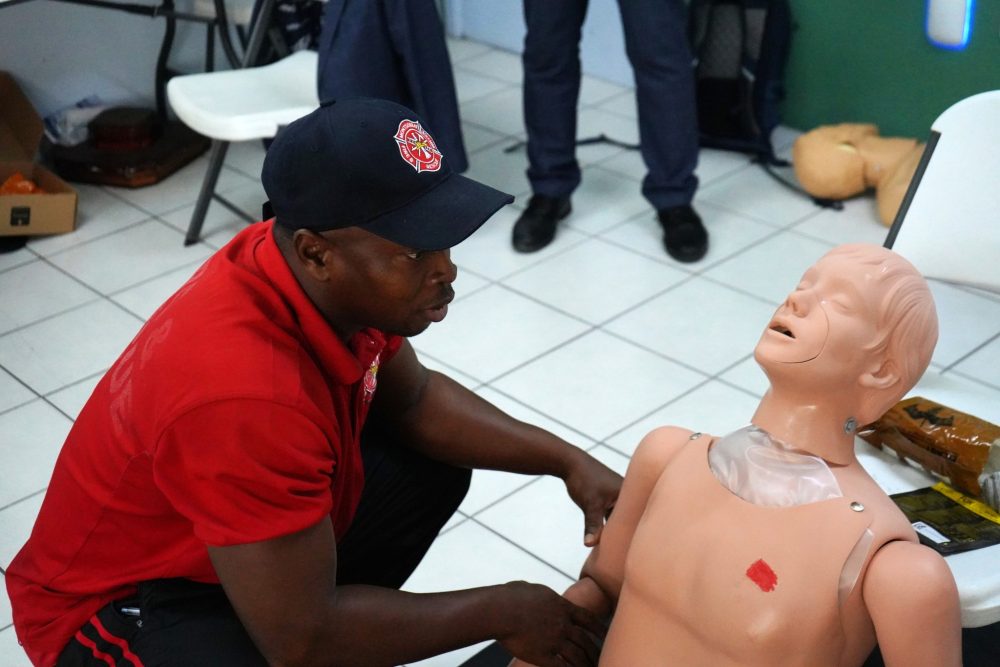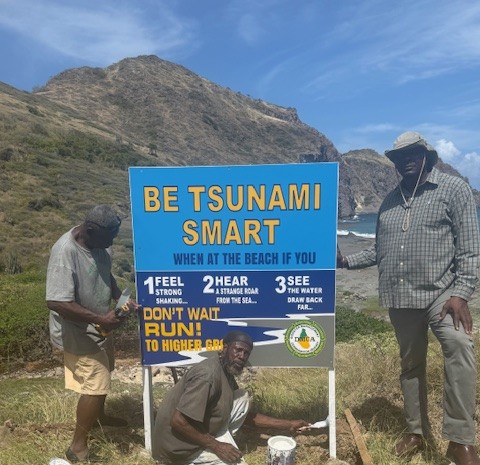Watch or read the full statement below.
Fellow citizens and residents of the Eastern Caribbean Currency Union (ECCU):
I address you at a time of great adversity and anxiety for our region and our world.
An Unprecedented Moment
This moment is like no other.
We have to go back more than 100 years to the 1918 Spanish flu to begin to comprehend the scale and scope of the COVID-19 pandemic. Thankfully, there will be far fewer fatalities, on this occasion. However, unlike 1918, our world is far more interconnected. For this reason, this is the first time in human history that all inhabitants of our planet (7.7 billion and counting) are at risk to the same disease; it is truly a global pandemic. Indeed, the shutdowns or lockdowns, now in force across our world, are without precedent. Needless to say, the pandemic has now morphed into a global economic downturn and an almost certain recession – a perfect storm.

Even at this relatively early stage, it is already clear that our world has been changed forever.
The COVID-19 pandemic will eventually be in our rearview mirror but its scars and lessons will linger long. That said, it has, as every crisis does, presented opportunities to enhance the way we live, work and conduct our daily lives. We can seize them if we proceed with a growth mindset.
The Economic Impact and ECCB’s Response
At this juncture, the International Monetary Fund (IMF) is projecting that the global economy will contract in 2020 on a magnitude same as or larger than the Global Financial Crisis. The extent of the economic impact depends on the length and severity of the pandemic and those are still unknowns at this time.
The ECCB has run several scenarios for the ECCU. Based on two such scenarios, economic activity in the ECCU is projected to contract between 5.0 per cent and 7.0 per cent (in real terms) in 2020 accompanied by a sharp rise in unemployment. Keep in mind that prior to this pandemic, economic growth in the ECCU was projected at 3.3 per cent.
Member Governments have fashioned and announced fiscal stimulus, or what may more aptly be described as care and relief packages, to help cushion the effect of the pandemic on individuals and businesses. With Tourism closed, this is an exceptionally challenging time for our governments because revenues have plummeted even as COVID-19-related expenditures have increased dramatically.
Since the outbreak of COVID-19, the ECCB has been focused on two priorities: (i) protecting our staff and (ii) serving our region. Here are some of the actions we have taken to date:
- First, provided financial support to Member Governments through a $4.0m grant ($500,000 each) from the Fiscal Reserve Tranche II – March 13;
- Second, reached an agreement with the ECCU Bankers Association on a loan deferral (moratorium) programme for customers for up to six months. A waiver of late fees and charges is applicable to eligible customers during that period – March 20;
- Third, created a page on the ECCB’s website to provide information on the Bank’s COVID-19 response – March 23;
- Fourth, discussed a loan deferral programme (moratorium) for customers with credit unions, the Caribbean Confederation of Credit Unions (CCCU) and national regulators – March 25;
- Fifth, increased governments’ share (75:25 from 60:40) of the credit allocation budget thereby increasing the Central Bank’s lending capacity to Member Governments – March 27;
- Sixth, instituted Bank-wide telecommuting – from March 30; and
- Seventh, reduced the Discount Rate to 2.0 per cent from 6.5 per cent – April 03. This is the rate at which the Central Bank lends to governments and commercial banks.

Our Central Bank has also convened meetings with Ministries of Finance of Member Governments to support the development of national and regional responses to COVID-19.
The ECCB is working very closely with the OECS Commission on procurement of critical supplies, assessments, resource mobilisation and coordination.
The ECCB is also actively engaged with the IMF and The World Bank on assistance for our member countries.
Our Central Bank continues to provide currency to banks in every member country to ensure, for example, ATMs/ABMs can be restocked, as needed.
In respect of payments, our Central Bank continues to play a vital role in ensuring payments are made on time, including payroll and pension payments for governments and social security systems which use the Electronic Funds Transfer (EFT) platform.
The foregoing actions have been taken to ensure that the ECCB effectively serves our region at this time.
The EC dollar remains very strong. As of Friday, 3 April, 2020, the Backing Ratio of our currency stood at 100.7 per cent. This is great news because it means that the buffers built up over many years will serve our Currency Union extremely well in this difficult period.
We anticipate that our Central Bank will need to extend additional credit to governments and banks. In a similar way, as the Central Bank has temporarily lowered the Discount Rate for governments and banks, the Central Bank is prepared, if necessary, to temporarily lower the Backing Ratio as additional credit is extended to governments and banks.
That said, the backing of our currency will remain far above the legal requirement at all times. As you may know, the ECCB Agreement requires a backing ratio of 60.0 per cent. Thankfully, our Central Bank has significant foreign reserves and the EC dollar will remain strong throughout this period.
We note the call to the G20 by the Heads of the IMF and The World Bank Group for a suspension of debt payments by the International Development Association (IDA) countries to bilateral creditors for a period of time. This call is no different from the moratorium ECCU banks and credit unions are providing to their customers. The principle is the same – provide temporary relief to countries until they can resume meeting their obligations.
The call of the Heads of the Bretton Woods institutions is consistent with ECCB’s advocacy, in recent years, for a disaster-linked clause to be inserted in the sovereign contracts of all small states. In a period of adversity such as we are now in, it helps if small countries can apply their limited liquidity to support rapid recovery before resuming debt payments and to do so with the prior consent of their creditors.
The Regional Government Securities Market (RGSM) is a critical aspect of the financial architecture in the ECCU. Last year, Member Governments issued a record 65 securities on the RGSM, which has been in operation since November 2002. The RGSM is not only a source of financing for government operations through the issuance of Treasury bills, but also an opportunity for citizens and residents to earn higher rates of return compared to the traditional instruments such as bank deposits. This Market remains available to all.
In economics, as in many disciplines, we work on the basis of assumptions. At this moment, our fight against this pandemic would be best served by relying on two basic assumptions. First, COVID-19 is no respecter of person, race, gender, class, wealth, position or power. Second, anyone can get it so everyone has it. If we proceed with these two basic assumptions, we will follow the protocols articulated by the health authorities, thereby protecting ourselves and each other.
Here in the ECCU, all eight member countries have confirmed cases, and these numbers are rising. If you wish to track the progress of the virus in the ECCU, please visit our website (www.eccb-centralbank.org) or Facebook page (ECCB Connects), where you will find a tracker with daily updates.
We extend our profound condolences to all who have lost loved ones to this pandemic both here at home and in the diaspora.
An Opportunity for Shared Sacrifice, Solidarity, Global Cooperation and Spiritual Closeness
The magnitude of this moment presents a compelling call for shared sacrifice and solidarity at all levels – governments, opposition parties, labour unions, business, civil society and citizens.
As Caribbean brothers and sisters, we must stand with each other, in firm solidarity, as we fight this common enemy – COVID-19.
At the global level, there is increasing recognition that this is a global problem that demands a global response. Of necessity, multilateral institutions must expand their toolkits, even create new instruments, if they are to deliver an effective response.
Fellow citizens and residents, social distancing does not mean spiritual distancing. On the contrary, now is the time for us to draw on our faith and practice spiritual closeness.
Not surprisingly, the most trending verse on the Bible app, YouVersion is Philippians 4:6-7 (NIV) which exhorts:
“Do not be anxious about anything, but in every situation, by prayer and petition, with thanksgiving, present your requests to God. 7 And the peace of God, which transcends all understanding, will guard your hearts and your minds in Christ Jesus”
An Imperative for Forward Thinking and Planning
Our health systems, already suffering from pre-existing conditions such as weak primary health care, limited secondary care infrastructure and funding and limited personnel, are now being tested severely. A rethink of our health care provision is urgent and must draw on critical lessons and resources from Cuba, such as its primary health care system and its abundant pool of trained doctors and nurses. We are grateful to Cuba for the critical support now being rendered to our member countries.
Once again, the issue of food security has come into sharp focus. Recall 2008 when food and fuel prices peaked and the regional conversation on food security that ensued. Going forward, as part of building resilience, we must ensure our focus for enhancing our capacity to feed ourselves does not shift when this crisis recedes. It has happened before. It must not happen again.
Even as we increasingly use electronic and digital channels to make payments; work from home (telecommute); and ramp up online delivery of education to our children and students, it is pellucidly clear that our work on building out a digital economy, with accompanying cyber-resilience, ought to be accelerated in the post-crisis period.
And for Tourism, our lifeblood, important plans must be laid now in preparation for the economic “snapback”.
If you are bored at home, now would be a good time to set some short-term goals such as lose some weight, read a book or complete an online course.
Know Your Source
In finance and banking, we use the term KYC, which means Know Your Customer. In this era of social media and, regrettably, fake news, knowing your source by checking the source of your information is essential. Please remember not everyone who possesses a smartphone is smart and not everything you receive on social media is true.
Rely only on credible sources such as the World Health Organization (WHO), the Pan American Health Organization (PAHO), the Caribbean Public Health Agency (CARPHA), the ECCB and of course, your health and government officials.
Kudos to our Frontline Warriors
We applaud all the essential workers who are on the frontline of this global war including our doctors, nurses and allied healthcare professionals, public utilities, media, security forces and all other essential workers.
We can help them to help us by adhering to the protocols such as boosting our immune systems, proper hand hygiene, physical distancing and staying at home.
We also recognise our farmers, fisher folk and food distribution personnel.
Conclusion
We urge everyone to fully consider the opportunities now presented to our region by this pandemic.
The current challenges necessitate that our Central Bank adopt proactive and accommodative policies in the fulfilment of its mandates. To those ends, the ECCB stands shoulder to shoulder with Member Governments, commercial banks and regional and international partners to help mitigate the health and socio-economic impact of this pandemic on the ECCU.
We are in a difficult season but we are resilient.
Let us neither doubt our collective strength nor our faith in our God.
Remember we are all in this fight together.
Together, with the help of Almighty God, we shall overcome.
I thank you.
Click here for Governor Antoine’s Statement on COVID-19 Pandemic: PDF | Video | Audio
Discover more from Discover Montserrat
Subscribe to get the latest posts sent to your email.



